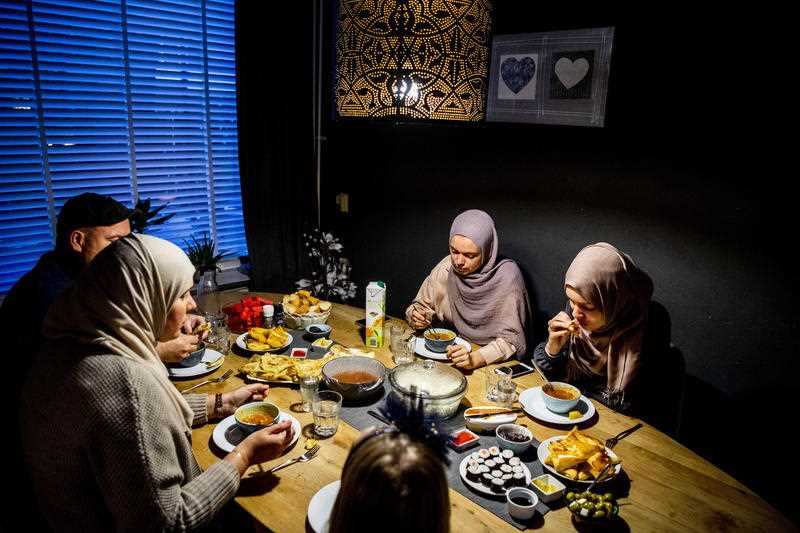Mosques stood empty and fast-breaking feasts were cancelled as Muslims around the world began marking Ramadan under coronavirus lockdown on Friday, while a pushback in some countries sparked fears of a surge in infections.
Mecca's Grand Mosque, Islam's holiest site, was among those devoid of worshippers as the holy month got under way amid unprecedented bans on family gatherings and mass prayers.
A stunning emptiness enveloped the sacred Kaaba - a large cube-shaped structure in the Grand Mosque towards which Muslims around the world pray - in the most potent sign of how the daytime fasting month will be a sombre affair across Muslim-majority nations.
Ramadan is typically a period of both worship and socialising, but this year strict lockdowns limit gatherings for iftar meals at dusk when the fast is broken - a centrepiece of Ramadan.
The measures have put a damper on spirits in Indonesia, the world's biggest Muslim-majority nation, where national religious organisations have called on the faithful to stay at home.
"This Ramadan is very different - it's just not festive," said Indonesian housewife Fitria Famela.
"I'm disappointed that I can't go to the mosque, but what can we do? The world is different now."
Similar sentiments echoed across the Middle East and North Africa, where multiple towns and cities are under round-the-clock curfew.
Countries such as the United Arab Emirates, Iraq, Libya, Tunisia and Algeria have partially eased the lockdown, but Morocco has announced a night-time curfew for Ramadan as it steps up emergency measures to combat the virus.
The North African nation's Council of Oulemas, the official religious body, called for confinement to be respected during Ramadan, saying Islamic sharia law put saving lives above all else - even meeting for prayers.
However, some religious leaders in Asia - home to nearly a billion of the world's Muslims - have shrugged off fears about the spread of COVID-19.
In Bangladesh, the fundamentalist Hefazat-e-Islam group criticised government moves to restrict access to more than 300,000 mosques nationwide.
"Quotas on prayer attendance are against Islam," Mojibur Rahman Hamidi, a Hefazat official, told AFP.
"A healthy Muslim must join prayers in a mosque. We hope that, if we pray hard, Allah will save us from the coronavirus," he added.

A family eat at the table during the iftar, the meal after sunset during the Islamic fasting month of Ramadan, in Rotterdam, The Netherlands Source: AP
'We must accept it'
The top Islamic organisation in Indonesia's conservative Aceh province also publicly bucked a national order to stay at home.
Several thousand worshippers attended evening prayers Thursday at the biggest mosque in the region's capital Banda Aceh, though crowds were smaller than usual.
The threat of large religious gatherings has been highlighted in recent weeks by waves of infections in Asia linked to separate, massive Islamic congregations in Malaysia, Pakistan and India.
The COVID-19 death tolls across the Middle East and Asia have been lower than in Europe and the United States but are rising steadily, sparking fears the virus may overwhelm often underfunded healthcare systems.
To limit exposure, the World Health Organization has urged countries to "stop large numbers of people gathering" in places associated with Ramadan activities, such as entertainment venues, markets and shops.
Mohamad Shukri Mohamad, the top Islamic cleric in the conservative Malaysian state of Kelantan, planned to skip public prayers and family meals - even if it meant not seeing his six children and 18 grandchildren.
"This is the first time in my life that I've been unable to go to the mosque," he told AFP.
"But we must accept it and obey the rules of social distancing to protect our lives."
'Sinful'
The restrictions have hit businesses hard, including retailers who would normally be preparing for the Ramadan rush.
This year many Muslims are saving their money for masks, gloves and other COVID-19 protective gear.
In Lebanon, the threat of the virus and a severe economic crisis have put a damper on Ramadan festivities, with the streets in the capital Beirut largely empty.
"Sales will drop by more than 75 percent compared to previous years," predicted Samer Hallab, a sweets shop owner in the northern Lebanese city of Tripoli, famous for its Ramadan desserts.
Mr Hallab said his business has taken a hit as the crisis has made sweets a luxury and the lockdown prevents large nighttime gatherings.

A man wearing a protective suit prepares Ramadan Food packages to be distributed to households in Istanbul, Turkey, 24 April Source: AP
Hardliners across Islamic nations have rejected some online suggestions by Muslims that they should be exempt from fasting this year owing to the pandemic, insisting that while social distancing was necessary, the virus did not stop them from observing the rules of Ramadan from home.
Still, many have considered skipping the daytime fast over fears it could weaken their immune system.
"It would be sinful to miss it because fasting is mandatory," said Indonesian bank employee Amalia Nur Istigfarin.
"So I'll try other things to boost my immune system like exercise and taking vitamin C," she added.
People in Australia must stay at least 1.5 metres away from others and gatherings are limited to two people unless you are with your family or household.
If you believe you may have contracted the virus, call your doctor (don’t visit) or contact the national Coronavirus Health Information Hotline on 1800 020 080.
If you are struggling to breathe or experiencing a medical emergency, call 000. SBS is committed to informing Australia’s diverse communities about the latest COVID-19 developments.



